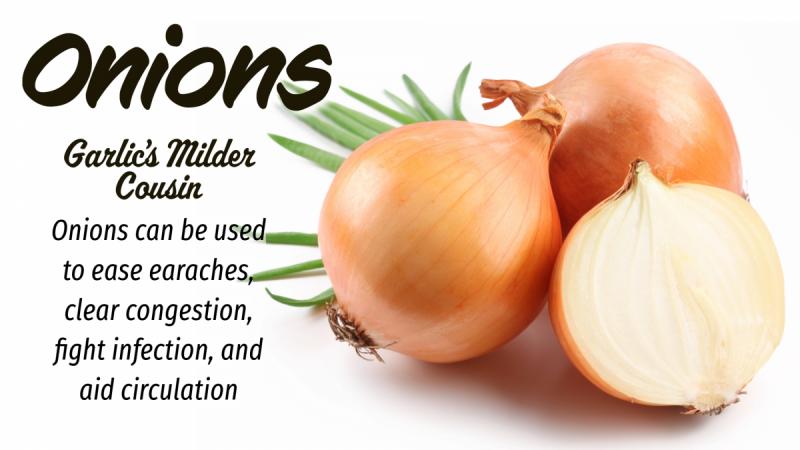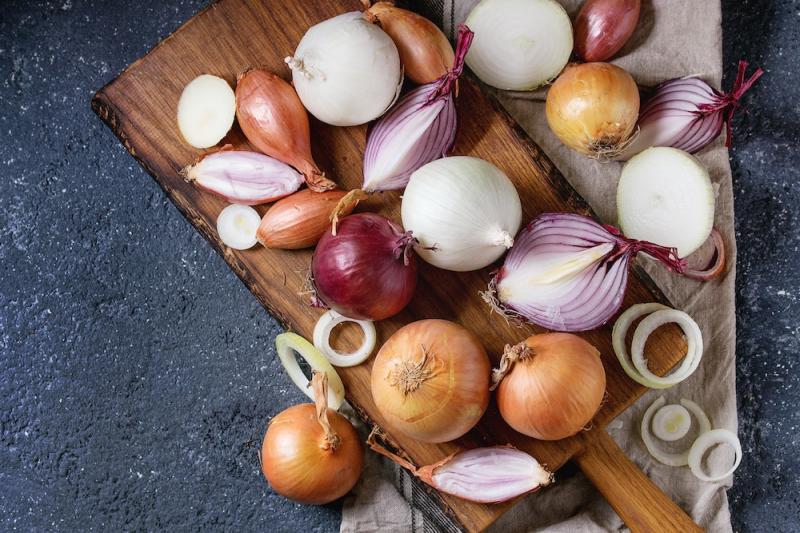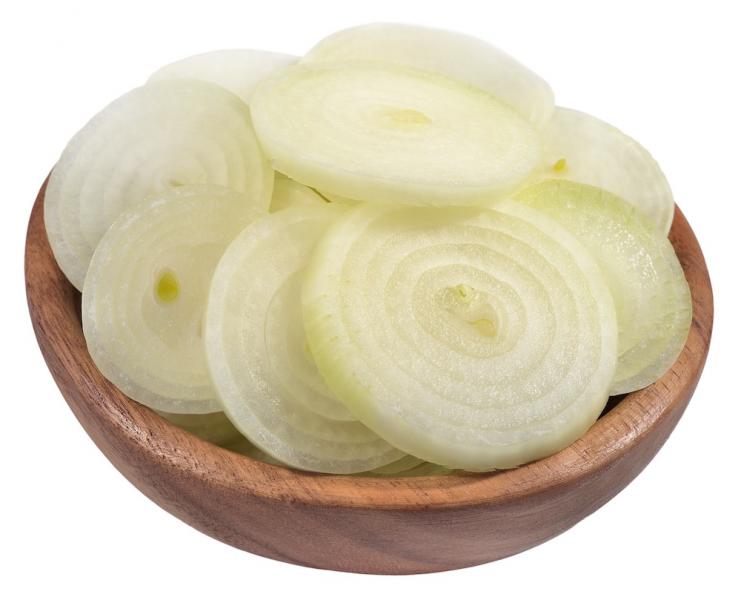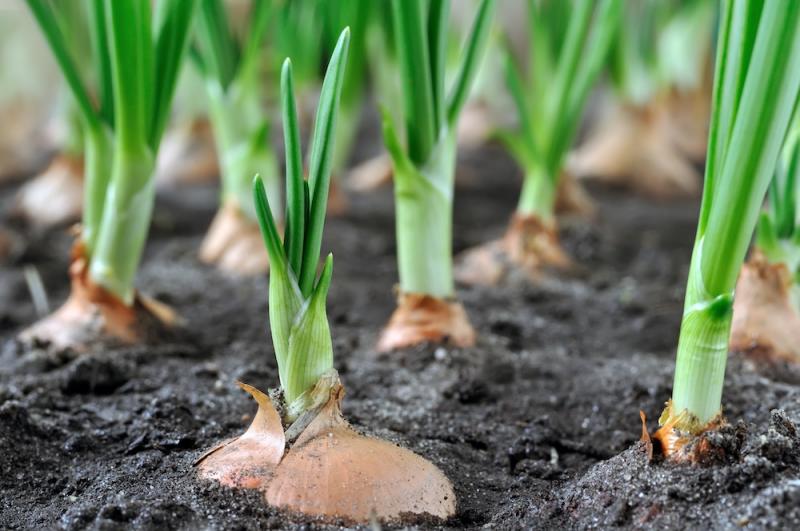
You might be surprised by how many of the things you think of as foods can be used as medicine. The humble onions you find in grocery stores (Allium cepa) is a great example of a common food you can use as medicine. Onions have very similar uses to garlic (Allium sativium), but are milder in action, which means they are more easily tolerated by people who are sensitive to spicy foods.
Using Onion for Earaches
 The first time I used onions as a medicine was when one of my children had an earache and the other remedies I had tried weren't working. I had used garlic oil and lobelia, both warmed to body temperature (see caution below), in the ears and the child was still experiencing pain in the ears. And while I’ve had great success in using raw garlic for relieving earaches on myself, I felt garlic would be too harsh and irritating a remedy for a toddler. So I decided to try onion instead.
The first time I used onions as a medicine was when one of my children had an earache and the other remedies I had tried weren't working. I had used garlic oil and lobelia, both warmed to body temperature (see caution below), in the ears and the child was still experiencing pain in the ears. And while I’ve had great success in using raw garlic for relieving earaches on myself, I felt garlic would be too harsh and irritating a remedy for a toddler. So I decided to try onion instead.
Following a suggestion I'd read in a book, I cooked an onion with the skin on to soften it up, then smashed up some of the cooked onion to release some of the juices. I added a very small amount of water so it would be more liquid and used it as drops in the ears. It relieved the pain within a few minutes. Needless to say, I was very impressed.
After that success, I started using onion on any earache my kids had that didn’t respond to garlic oil and lobelia. However, I stopped trying to squeeze the juice out of the cooked onion, and opted to just cut the cooked onion in half and place the warm onion against the ear like a compress. That seemed to work well, too. (You can cook the onion by baking it or steaming it with the skin on until it is soft.)
For older children, with less sensitive skin, you can just cut a raw onion in half, coat the cut edge with olive oil to reduce irritation to the skin, and hold it against the infected ear for about 20-30 minutes. This is the same technique I use for raw garlic, and onion works great, too.
A Caution About Earache Remedies
It is important for me to stress that when using anything in the ears, especially with children, it’s very important to warm it to body temperature. If the mixture is too cold it causes the blood vessels in the ear to contract, which increases the pain (something I've experienced firsthand with myself). And, you don’t want it so hot that it burns either.
I used to warm the tincture or oil by putting the bottle in hot water, but that ruined the label, so I started just sticking the bottle in my pocket or putting it under my armpit until it warmed up. I test the temperature by putting a drop on my wrist, in the same way you test the temperature of a liquid from a baby bottle. If it feels too hot or cold on your wrist you need to adjust the temperature. It should feel neutral to just barely warm.
Onions for Coughs and Congestion
 Onion can also be a great remedy for coughs. Like garlic, it loosens mucus in the lungs and helps expel mucus from the lungs and sinuses, as anyone who has peeled and chopped pungent onions has experienced first-hand. Onions have a long history of use for congestion in both Western and Oriental traditions. For example, Allium chinense (Chinese onion) is used in Chinese medicine to relieve congestion, expel mucus, and ease chest pain. It is also used for intestinal problems.
Onion can also be a great remedy for coughs. Like garlic, it loosens mucus in the lungs and helps expel mucus from the lungs and sinuses, as anyone who has peeled and chopped pungent onions has experienced first-hand. Onions have a long history of use for congestion in both Western and Oriental traditions. For example, Allium chinense (Chinese onion) is used in Chinese medicine to relieve congestion, expel mucus, and ease chest pain. It is also used for intestinal problems.
One way to use onions to relieve congestion is to make a cough syrup from them. To do so, peel and thickly slice the onion (the more pungent varieties work the best). Place a slice in a glass container and sprinkle a little raw sugar over it (alternatively, you could drizzle a little raw honey over it). Add another slice, sprinkling more sugar or honey on that slice. Continue the process until all the slices have been lightly coated with the sugar or honey.
Cover and allow the onion slices to sit for an hour or two, then squeeze all the juice out to make the cough syrup. You can take a spoonful or two of this syrup as needed to help loosen and expel mucus. It will also help fight the infection.
Antimicrobial Actions of Onions
Like garlic, onions can help the body fight bacterial, fungal, or viral infections. The more pungent the onion variety, the better it’s going to be at fighting infections. Also, like garlic, if you want the antimicrobial effects you will want to use fresh onions, not cooked or dried onions.
Many years ago I discovered that the best way to get rid of a cold was to use pungent herbs in the early stages to help increase mucus flow and flush out what was irritating the body. I’ve primarily used capsicum, ginger, mustard, and garlic for this, but onions can also help.
One way I enjoy using onions to help fight infections is to make some fresh salsa. I combine freshly chopped onion, some finely chopped jalapeño or other hot pepper, and some freshly minced garlic, with chopped tomatoes and I mix that with some salt and lime juice. Chopped cilantro can be a great flavor addition and for variety you can also substitute mangos or peaches for the tomatoes.
Eating this fresh salsa can help to loosen mucus in your sinuses and lungs and flush out the congestion. It also helps circulation and digestion, making it a great way to use food as medicine.
Other Benefits of Onions
 Onions can also benefit circulation. They help to reduce blood cholesterol and triglycerides and have a modest hypotensive effect. They also help to prevent blood clots.
Onions can also benefit circulation. They help to reduce blood cholesterol and triglycerides and have a modest hypotensive effect. They also help to prevent blood clots.
Onions are also a good source of the flavonoid quercetin, which helps zinc get into cells and inhibit viral reproduction. Quercitin helps to calm down allergic reactions, too.
Plus, the sulfur compounds in onions and garlic also aid the liver detoxification process known as sulfation. This is the principal pathway for eliminating excess neurotransmitters, which helps to stabilize your mood. It also helps eliminate some drugs (including acetaminophen), some food additives, many environmental chemicals, and toxins from intestinal bacteria. Reduced sulfation may be involved in neurological disorders such as Parkinson’s and Alzheimer’s and in environmental illness.
Using Wild Onions
The Allium genus is one of the largest in the world containing between 600 to 900 species. It includes chives (Allium schoenoprasum), leeks (Allium ampeloprasum), shallots (Allium ascalonicum), garlic chives (Allium tuberosum), and scallions (which come from several species). There are also many varieties of wild onions which grow practically everywhere. There are at least six species here in Utah. I often see them in the spring when I go hiking.
Wild onions have a stronger flavor and aroma than store-bought onions, making them closer to garlic in strength. I've eaten them many times and found them to be quite tasty. They have great medicinal properties as well. You can crush fresh onion and put it on insect bites or use it as a poultice to draw out infection in wounds. They are also decongestant, aid circulation, and help fight infection. If you want to try wild onions make sure you’re harvesting onions and and not a toxic plant with similar leaves. Onions have hollow leaves and will smell like onions or garlic.
In these times when many people are experiencing tighter budgets, it’s helpful to know that many common foods from the grocery store have medicinal value. And one great thing about experimenting with using foods as medicines is that you know that they are safe to use. So, like I did with using onions for earaches, you can try using them without worrying about harmful effects. I'll be talking about other common foods that have medicinal value in future articles to help inspire you.
Downloads
Steven's Articles
-

-
The Health Benefits and Problems with Coffee
This popular caffeinated beverage can be beneficial…
October
-

-
Understanding Caffeine & Cellular Adaptation
Preserving the power of caffeine's buzz and the…
September
-

-
Horseradish
A pungent spice for aiding protein metabolism…
-

-
Banaba or Crepe Myrtle
A beautiful tree from Southeast Asia whose leaves…
August
-

-
Monkeyflowers
Flower essences to help see ourselves more clearly…
-

-
Mariposa Lilies
Strengthening the bond between mother and child…
-

-
The Noble Bay Leaf
A common kitchen herb for aiding digestion and…
-

-
Epimedium: Horny Goat Weed
A circulatory stimulant and kidney yang tonic…
July
-

-
The Medicinal and Nutritional Benefits of Apricots
A nutritious fruit and valuable medicinal seed for coughs
-

-
Dogwoods
Asian dogwood is used to stop excessive discharge,…
June
-

-
Neem: The Village Pharmacy
A popular Ayurvedic remedy for dental and immune…
-

-
Spilanthes: The Toothache Plant
A traditional remedy for teeth and gums, as well…
-

-
Forsythia
An anti-inflammatory, fever-reducing, and infection fighting herb
May
-

-
Buckwheat (Kashi)
A delicious, high protein, gluten-free, gut-healthy food
-

-
Leaky Gut Syndrome
Plugging the leaks on the underlying cause of…

